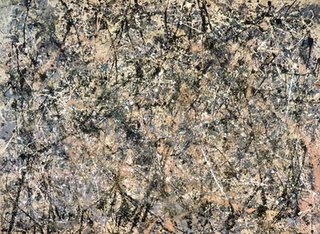
One of my brighter Art Center students came up to me today and seemed distraught. She told me she'd had a "discussion" with a friend in which they disagreed about the nature of art. Her friend suggested she go out and ask a few more people's opinions. The issue? They were debating whether or not all art is political.
Fortunately, my student was smart enough to know that the answer partly depends on what your definition of political is, but she seemed more than a little disappointed by the rapidity with which I said I thought, sure, art is political. (I guess I know what side of the argument she was making...). We talked about how, in Western art before modernism, all art was political in the sense that it reinforced the power of the church and state. In The Invisible Dragon, Dave Hickey convincingly talks about the art of the Baroque, for example, as a form of religious propaganda.
Things obviously get muddier the closer you come to the present. After all, what is political about a Pollock? An image like Lavender Mist (above) doesn't seem to have much to do with politics. Turns out that there may be plenty. Not too long ago, Louis Menand contributed an article to the New Yorker in which he addressed the oft-made claim that Abstract Expressionism was a tool of the CIA. I've been interested in this idea for a while - one of art my heroes, the poet Frank O'Hara, was involved in the development of international touring exhibitions of the art some have called political propaganda for American-style democracy. I'm fairly sure, based on my research, that he was as apolitical as they come (which I consider a fault, but that's another story).
What I realized (too late) that I should have said is that I don't think anything is inherently anything - things become meaningful based on how they are used. Art may not be intended to serve some political agenda, but once it leaves the artist's studio and belongs to the world, it gets put to use in ways the artist never imagined. Many people like to say they hate political art, but I think what is often meant by that statement is that they hate art which is overtly political - art that insists on being used in a certain way, like some craft objects insist on being used in certain ways by their use of certain forms and participation in certain traditions. It makes sense to hate art that is dictatorial as much as it makes sense to hate governments that are dictatorial.
Of course, this raises a whole slew of issues – how do we make sure the objects we make are put to uses we don’t find deplorable? Should we care? If we don’t care, are we immoral? I’d greatly appreciate your comments so I can pass them on to my student…
No comments:
Post a Comment